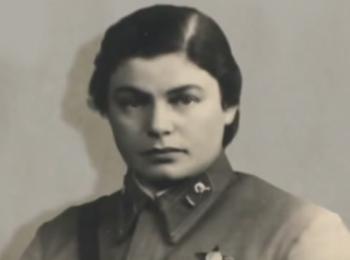Mira Polyakova was born in 1908 in St. Petersburg, in a Jewish family. Mira's parents were enthusiastic supporters of the nascent Soviet regime. Both of them worked at the People's Commissariat of Foreign Trade. Their job entailed frequent and lengthy trips abroad, and they took their children along with them. As a result, Mira became fluent in English and German.
In the early 1930s, Mira (who had changed her first name to Maria by that point) worked at the Young Communist International, a Marxist youth movement. Shortly thereafter, she was recruited by the Soviet intelligence organs. In 1935-1936, Maria Polyakova underwent a year-long training at the school of the Intelligence Directorate of the Red Army. After the end of her studies, she was sent to Geneva, where she became an illegal resident spy, reporting to the Intelligence Directorate. Polyakova was subsequently transferred to Berlin, where she passed herself off as the daughter of a wealthy Danish family. After receiving an invitation to the Danish embassy, Maria exchanged her password for an Austrian one, moving to the opposite end of the city.
As a Jew and a spy, Polyakova put herself in danger by staying in Nazi Germany in 1937. Nevertheless, she continued to meet with contacts, recruit agents, and send secret materials to Moscow. She was recalled to Russia in late 1937.
The Polyakov family was affected by the "Great Purge" of 1936-1938, which involved the arrests of almost 1.5 million people. Maria's brother and father were arrested on false charges, and executed shortly thereafter (both would subsequently be rehabilitated). As the sister and daughter of "enemies of the people", Polyakova was supposed to be dismissed from the Red Army. However, Kliment Voroshilov, the People's Commissar for Defense of the USSR, interceded on her behalf, and she was allowed to remain an intelligence operative.
Following the Nazi invasion of the USSR in late June 1941, Maria Polyakova joined the operational group of the GRU (the Main Intelligence Directorate). She remained in Moscow. The Soviet intelligence chiefs organized teams of experienced military spies, who were supposed to spring into action if the city fell to the enemy. Polyakova led one of these teams. She lived under an assumed name in an abandoned apartment, where a radio transmitter had been concealed. There, she would decode the radiograms she was receiving.
In the course of the war, Maria Polyakova was awarded the Order of the Patriotic War, 2nd class; the Order of the Badge of Honor, and some medals.
Maria's husband, the revolutionary Iosif Ditska, was killed in action in August 1941, while carrying out a special assignment behind German lines in German-occupied Poland.
After the end of the war, Polyakova taught at a special school that trained military intelligence operatives.
In 1956, she retired from the army, and went on to pass the entrance exams to the Military Institute of Foreign Languages.
Maria Polyakova subsequently taught correspondence courses at the Institute of Foreign Languages, worked at a publishing house, and served as a Russian-language teacher for foreign diplomats and journalists.
Maria Polyakova died in Moscow in 1995.







